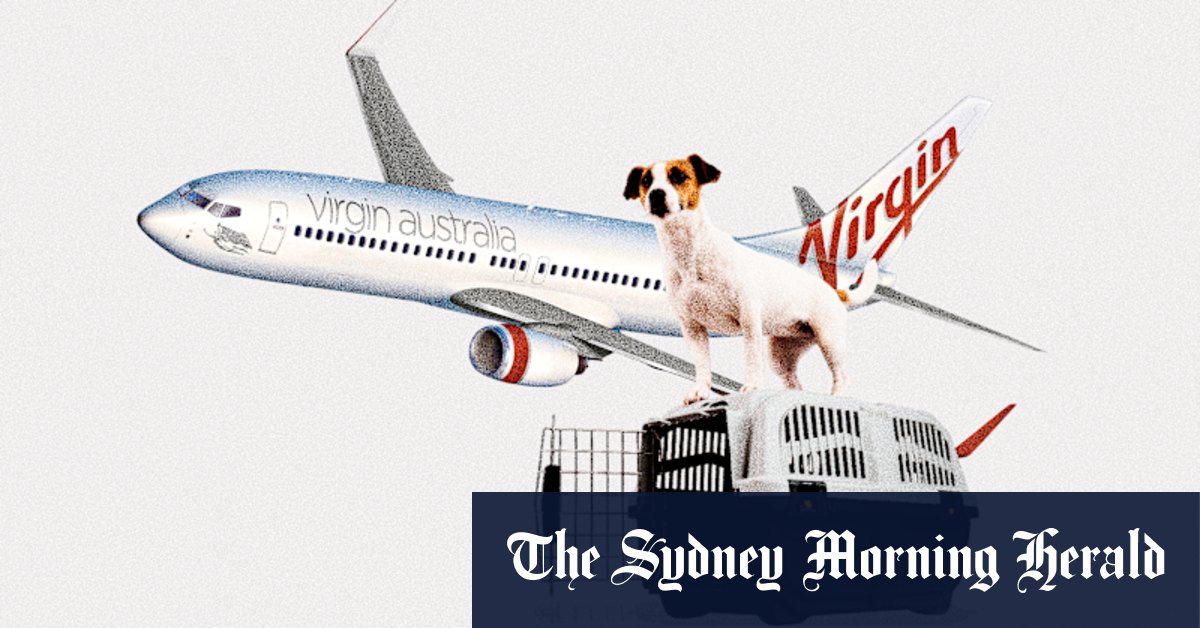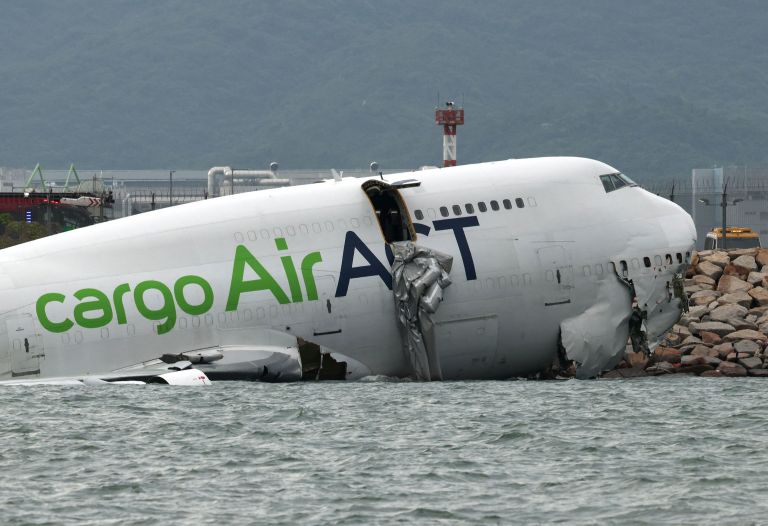Small dogs and cats will be permitted to travel underneath the seat in front, secured in a carrier.Credit: iStock
What is the pilot’s role?
As Virgin moves ahead with its plans, the process by which pilots will judge the safety of dogs and cats remains unclear. Under Civil Aviation Safety Authority rules, a pilot in command must take reasonable steps to ensure the carriage of an animal does not adversely affect the safety of the flight.
“A person may only bring an animal onto an aircraft with your [the pilot’s] permission. Before you [the pilot] give permission, all reasonable steps must be taken to ensure carrying the animal will not adversely affect aviation safety,” CASA general operations and flight rules say.
What constitutes a “reasonable step” may vary depending on the airline, aircraft type and the animal being carried. Virgin already transports dogs and cats in its planes’ cargo holds, as well as “non-exotic” birds, rabbits, guinea pigs, mice, rats, snakes and lizards.

A common sight overseas. In New Jersey, an airline passenger checks in his pet labradoodle.Credit: iStock
How much will travelling with a pet in a cabin add to your airfare?
Virgin hasn’t provided the cost yet. There will be one. In the US, United, for example, charges $US150 ($230) for a pet in the cabin, each way. What is spent on pet travel may be saved on lodging a dog or cat while away, Jopp said.
“It’s always difficult to find a dog sitter, and you might feel that owner’s guilt if you have to leave a dog in a kennel when you are going on a holiday. So the ability to take a pet with you on the holiday might be something that a lot of people are looking for.”
What about people who don’t like pets?
“Not everyone is an animal person,” said Jopp. “They might be allergic to cats, perhaps. You never know how your pet is going to react the first time they go on a flight, especially during the take-off and landing. Maybe they’ll become nervous; maybe they’ll start barking or howling.”

Credit: Getty Images
They could become nauseous. There is the possibility of backlash from people who oppose pets in planes, Jopp said.
Nevertheless, a poll of pet owners commissioned by Virgin showed nearly 70 per cent of respondents said they would travel with their pet in the cabin if given the option. RSPCA Australia said it welcomed the announcement by Virgin. Nearly 70 per cent of the nation’s households own pets.
What about people with allergies to pets?
Food Safety Australia New Zealand noted in its report allowing animals to be based in the same space where food is prepared and served that Virgin said it could relocate passengers with animal allergies or compromised immune systems away from the rows where the pets are.
Submissions from individuals to FSANZ focused on concerns about health impacts for people with allergies to animals, but “non-food allergens” were beyond the scope of the application made to the regulator.
“Submissions from individuals were almost evenly divided between support and non-support” for pets in cabins, it said.
Loading
For those with pet allergies on planes, the US-based Asthma & Allergy Network, which opposes pets on planes, has laid out a plan of action: “Request to sit as far away as possible from pets when making a reservation, wear a mask or nasal filters to block pet allergens, pre-medicate with an antihistamine or nasal spray, and carry a quick-relief [Ventolin] inhaler if you have asthma.”
What about the pets themselves?
Dr Sam Kovac, founder of Sydney-based Southern Cross Vet said dogs and cats, like humans, also have Eustachian tubes that connect their ears, nose and throat. A pressure change can sometimes cause a sensation of build-up and even ringing for the animals.
“Dogs and cats can’t tell us if they’re experiencing discomfort, and we can’t give them a lolly to suck on, or tell them to yawn.” However, special dog earmuffs exist to help with the pressure changes, he said.
Bringing a chew toy on board with your pet “can help to equalise the pressure for a more enjoyable flight,” Kovac said. Travelling animals can also get motion sickness. “Turbulence, the unfamiliar environment and take-off and landing can cause dogs to whimper,” said Kovac. “However, as they’re with their best friend [you], gentle affection and cuddling likely minimises this.”
RSPCA Australia said: “Guardians should ensure that their pet is under control, socialised to other animals and people, and calm and comfortable when travelling.”
When is this set to begin?
FSANZ approved pets in cabins on select Virgin Australia flights in June, the airline’s CEO, Dave Emerson, revealed last month.
An FSANZ statement said: “We assessed the microbiological food safety risks and found that, with appropriate risk management controls in place, the presence of pet cats and dogs in aircraft cabins presents a low risk to passengers.”
Emerson said the airline, which relisted on the ASX in June, looked “forward to sharing more details with travellers about our trial flights in the coming months”.

‘A sense of family’: The role of pets has changed.Credit: iStock
Why this change?
Pets are more important than they used to be for many people, so allowing them on planes appears to follow this trend. The Victorian government commissioned a first-ever statewide pet census in the 2022-23 budget, finding that a quarter of those surveyed said owning a pet gave them “someone to look after” and provided a sense of family.
In May, Italy’s aviation regulator decided to allow airlines to carry dogs larger than eight kilograms on planes. Italian Civil Aviation Authority president Pierluigi Di Palma described the change as a response to new societal needs.
Jopp said declining birth rates had perhaps caused a rethink about the roles of pets.
“Maybe that is a sign people are replacing children with pets, and maybe that’s part of the higher status that is now given to your pet cat or dog, because it really becomes a part of the family.”
Indeed, public figures as varied as Elon Musk, Italian Prime Minister Giorgia Meloni, and the late Pope Francis have sounded the alarm on declining birthrates. Francis called out people who did not want children for reasons of “selfishness”.

A man with a falcon shops at Hamad International Airport in Doha, Qatar.Credit: Getty Images
“Sometimes they have one, and that’s it, but they have dogs and cats that take the place of children,” he said.
Jopp said: “I think that the dog has gone from being out in the yard and in the kennel to in the house to on the bed in many cases. So I think the position of the pet in the family has changed over the past couple of decades.”
He said some of the views around animals differed between cultures.
In the Middle East, there isn’t a special allowance for dogs or cats – but falcons are “seen with great respect and cultural significance”, particularly by the region’s wealthy, he said. For example, Emirates’ website says: “Pets are not permitted in the cabin, with the exception of falcons between Dubai and certain destinations in Pakistan.”
The Business Briefing newsletter delivers major stories, exclusive coverage and expert opinion. Sign up to get it every weekday morning.


